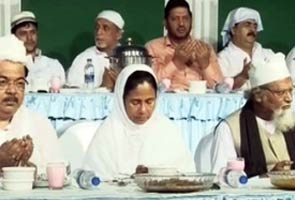 URDU AND MUSLIM IDENTITY IN INDIA
URDU AND MUSLIM IDENTITY IN INDIA
Paper No. 5637 saag.org Dated 27-Jan-2014
by Ramashrey Upadhyay
When the Lok Sabha elections are only a few months away, the union Minority Affairs Minister K. Rahman Khan while inaugurating an Urdu festival on January 3 in Maharashtra flagged off a huge column of about 50,000 school students carrying banners and raising slogans demanding promotion of Urdu language.
Expressing anguish he said, “the Muslims have never held a protest or campaign for the protection and promotion of Urdu language despite the “Constitutional right to demand protection of our mother tongue”.
The Minister knew very well that except for a limited group of Muslims in UP, Bihar and some other urban centres in north and central India, Urdu is not the mother tongue of Muslims all over the country. Yet he is propagating a lie that the Urdu language is the mother tongue of the entire Muslim community in India and what is worse- he is desperately linking the language as part of Muslim identity.
The Minister who is part of the present government deliberately ignored the fact that the communal legacy of Urdu was the first issue taken up for dividing the Indian society during British rule. What should be our concern is that these demands are being given prominence just on the eve of elections. We saw this in the State elections in Uttar Pradesh in 2012 when the Union Minister Salman Khurshid took up the issue of reservation for Muslims which was the legacy of All India Muslim League and not that of the Congress. Historically, Urdu was born out of the socio-administrative requirement of the Muslim conquerors who preferred to settle down in the regions around Delhi. In this, they broke from the traditions of the past invaders like the Huns or Kushans in Arabising and Persianising the local dialects and used it as the lingua franca for communication between the alien soldiers and the native dwellers.
This linguistic separatism played a major role in creating a communal divide from which India is still to recover.
Sir Sayed Ahmad (1817-1898), a first British loyal Muslim leader turned the Urdu-Hindi controversy into a political one at the cost of Hindu-Muslim unity against the British. Sayed’s snobbish observation before the Education Commission (appointed by the British) that Urdu was “the language of gentry and Hindi that of the vulgar”, was repudiated by his contemporary Hindi protagonist Babu Harish Chandar. He retorted that “Urdu was the language of dancing girls and prostitutes” (Yusuf Abbasi- Muslim Politics and Leadership in the South Asian Sub-continent, p.90). Since then Urdu has been mired in one controversy or other and used as a political tool to continue the communal divide during British India and after.
Replacement of Persian with Devnagari from the language of the courts on 18 April 1900 by McDonnell, the Chief Commissioner of Oudh gave fresh ammunition to Muslim leaders to demand the restoration of Urdu in place of local language. The then Mohammedan Anglo Oriental Defence Association (an outfit of the Aligarh movement) was renamed as the “Urdu Defence Association” and an aggressive campaign thus began. This movement soon converted itself into one in search of a “muslim identity” which they believed is cannot be done without promoting an aggressive agitation in favour of Urdu language.
‘Jinnah, who could not write his own name in Urdu, included the question of Urdu as one his famous fourteen points and cynically used it as a tool to forge a Muslim identity.’ (S.K.Ghosh, Muslim Politics in India, 1968, p.15.) He exploited Urdu to widen the gap of cultural divide between Hindus and Muslims though ‘he could not speak a word of Urdu’.( Rafiq Zakaria, The Widening Divide, p.105.) At the height of the partition demand by the Muslim League, the Muslims repudiated the slogan that was ‘Urdu-Muslim-Pakistan’.
Urdu does not have any religious or Islamic cultural identity. Had it been so, there would not have been any conflict between the Urdu speaking Muslims of West Pakistan and Bengali speaking Muslims of East Pakistan, which is now Bangladesh. Had Urdu been the cultural legacy of Islam, Muslims all over the world would have adopted it. In the present day, Urdu has just become another issue for our minister in the government in his self-seeking political interest and vote bank politics.
Pressure for “vote bank politics” was noticed when Urdu was made the second official language in Bihar, Uttar Pradesh, Himachal Pradesh and Andhra Pradesh. One may ask- Has it helped Urdu in spreading to other places or more popular? The answer is a definite “No”.
Since 1947 till today the sole agenda of the community leaders has been to frighten the innocent masses of the danger of their identity being lost. Besides Mosque and Madrasa, recognition of Urdu for Muslim identity has been added.
Unfortunately, the patron saints of political parties encourage such communal demands more to get their “vote bank support” and these issues start surfacing only at the time of elections and then left unattended until the next elections. Muslim identity is still secure without the Urdu language but such calls during election time do create confusion amongst the people.
It is not clear why the Muslim leaders in the political parties have not taken any initiative to launch any newspaper for the community that could be read all over. This could also help the community to understand the problems and challenges faced by the country from their perspective in an overall Indian context.
Note: The views expressed are author’s own.
